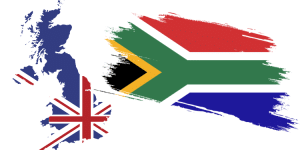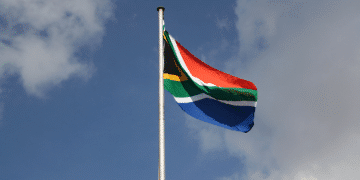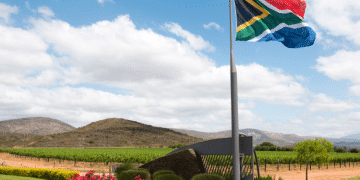Prince William Joins South African Youth Rugby Program: Breaking Barriers Through Sport
Royal Visit to Ocean View: A Special Rugby Engagement
Prince William’s four-day visit to Cape Town began on a high note with a memorable stop at Ocean View Secondary School.
This special visit allowed the Prince to engage with enthusiastic youth from three vibrant townships—Ocean View, Masiphumelele, and Langa.
The primary focus of this visit was to celebrate and spotlight the amazing work by the Atlas Foundation, which blends rugby training with digital skills programs.
A Warm Welcome and a Meaningful Exchange
As part of Prince William’s visit to South Africa, he was warmly welcomed by the founder of the Atlas Foundation, former England rugby player Jason Leonard.
Leonard provided an insightful tour of the Atlas Digi Bus, a mobile unit equipped with 40 laptops that serves students from Langa Township.
This program aims to enhance vital math, STEM, and digital literacy skills among elementary students, impacting close to 1,000 children weekly.
The Prince took keen interest in understanding how this initiative has helped improve the educational outcomes of the children.
Besides enhancing skills in language, math, and ICT, the Atlas Foundation’s programs also provide a safe haven for children, diverting their attention from potential gang involvement.
On the Field: Connecting Through Rugby
Prince William’s enthusiasm for rugby was evident as he joined coaching sessions on the Ocean View school fields.
This wasn’t just a ceremonial participation; he actively engaged with the students, moving effortlessly between groups.
South African rugby legends Joel Stransky and Percy Montgomery were there, offering guidance and also commenting on Prince William’s natural talent for the sport.
Stransky, reminiscing about the World Cup final of 1995 where he played a pivotal role, mentioned, “He was amazing. He was one of the boys, humble and upright human being.”
Montgomery added humorously, “It is a contact sport!” reflecting on a friendly collision between William and Stransky.
Both rugby icons praised the Prince’s athletic abilities and noted his genuine interest in the children.
Creating Safe Spaces and Opportunities
The Atlas Foundation has done remarkable work in converting what was once a field of stones into a platform for growth and development.
Percy Montgomery highlighted, “It’s not just about being on the rugby field, but giving kids other opportunities in life.”
This visit by Prince William provided the children with more than just rugby lessons; it offered them hope and a glimpse into a brighter future.
William’s interaction wasn’t limited to the rugby field. He also joined a digital skills session for primary school children from Langa Township.
The Atlas Digi Bus, with its 40 laptops, played a crucial role in this session, showing the integration of sports and education under one robust program.
Transition to Broader Impact
Prince William’s visit emphasized the significant role of rugby in South Africa. With over 10 million followers, rugby unites communities and promotes physical and mental well-being.
This engagement provided a sense of unity and support among the communities of Ocean View, Masiphumelele, and Langa.
Prince William’s visit to the Atlas Foundation at Ocean View Secondary School is a remarkable example of how sport can create safe spaces and provide alternatives to negative influences for young people.
His hands-on participation and interactions with the students and local legends send a powerful message of hope and resilience.
The Atlas Foundation: Creating Safe Spaces Through Sport
Foundation and Mission
The Atlas Foundation, founded in 2014 by former England rugby player Jason Leonard, stands at the forefront of using sport as a means to uplift underprivileged communities.
Leonard’s vision was to create safe spaces for children who often find themselves in vulnerable situations, offering alternatives to gang involvement through structured programs.
These programs focus on more than just play; they integrate critical life skills and educational opportunities, providing a holistic approach to development.
Multifaceted Approach
At its core, the Foundation combines the physicality and teamwork of rugby with essential digital education initiatives.
This innovative approach helps mentor students and keeps them engaged in productive activities.
By doing so, the Foundation shifts the focus from dangerous street activities to positive engagement in sports and technology.
Rugby Training
Rugby training is a pivotal part of the Atlas Foundation’s strategy.
It not only promotes physical fitness but also teaches important values such as teamwork, discipline, and respect.
The training sessions give children a safe environment to learn, grow, and build confidence.
As they hone their skills on the field, they cultivate a sense of belonging and achievement that counters the allure of gang culture.
Digital Skills with Atlas Digi Bus
The Atlas Digi Bus is another remarkable initiative by the Foundation.
This mobile classroom is equipped with 40 laptops and travels to various locations, providing essential digital education.
Children from townships like Langa benefit greatly from this program, which offers lessons in mathematics, STEM subjects, and digital literacy.
By bridging the digital divide, the Atlas Digi Bus empowers students with skills that are vital in the modern world.
Community Impact
The impact of the Atlas Foundation’s initiatives is profound.
With nearly 1,000 children participating in their programs weekly, the Foundation has observed notable improvements in language, math, and IT skills among students.
Beyond academics, the Foundation also addresses broader social issues such as gender-based violence, emphasizing the importance of respect and safety in all aspects of life.
Creating Opportunities
The true success of the Atlas Foundation lies in its ability to create opportunities beyond the rugby field.
By providing a combination of sport and education, the Foundation helps children envision a future where they can thrive both physically and intellectually.
The program identifies and nurtures their talents, helping them to steer clear of negative influences and focus on building a better future for themselves and their communities.
As the Foundation continues to grow, it remains committed to its mission of empowering youth through integrated sport and education programs.
Prince William’s Hands-on Participation
Prince William’s visit to Ocean View Secondary School was anything but a spectator event.
He rolled up his sleeves and dived headfirst into the rugby coaching sessions with an enthusiasm that bridged the gap between royalty and local youth.
The students, hailing from the townships of Ocean View, Masiphumelele, and Langa, were thrilled to have a prince among them, not just as an observer but as an active participant.

Engaging with the Students
Prince William’s approach was hands-on as he joined various drills and activities, moving effortlessly between different groups of children.
His natural athletic ability shone through, drawing admiration from both the students and the seasoned rugby icons present.
His participation wasn’t limited to the physical aspects of rugby either.
He engaged in conversations with the kids, sharing stories and making them feel seen and heard.
This personal touch left a lasting impression on everyone involved, demonstrating his genuine connection with the participants.
Interaction with Rugby Legends
The presence of South African rugby legends Joel Stransky and Percy Montgomery added another layer of excitement to the event.
They assisted Prince William in coaching the students, creating a vibrant atmosphere of learning and camaraderie.
Stransky, known for his pivotal role in the 1995 World Cup, praised William’s skills on the field and his humility off it.
“He was one of the boys,” Stransky remarked, highlighting how the prince’s down-to-earth demeanor resonated with the children.
Montgomery echoed this sentiment, noting the importance of William’s involvement.
He humorously commented on the light-hearted collision between Prince William and Stransky, reminding everyone that rugby is indeed a contact sport.
Both legends lauded William’s natural flair for the game and his sincere interest in the children’s lives, emphasizing how such involvement can have a profound impact on the community.
Beyond the Pitch
Prince William’s engagement extended beyond the rugby pitch into educational realms as well.
He participated in a digital skills lesson aboard the Atlas Digi Bus, a mobile classroom equipped with 40 laptops.
This initiative, part of the Atlas Foundation’s broader mission, aims to enhance digital literacy among primary school children from Langa Township.
By combining rugby training with digital education, the foundation provides a holistic approach to youth development, steering them away from gang involvement and towards positive futures.
Montgomery reminisced about the early days of the program, recalling how a field of stones was transformed into a nurturing ground for dreams and aspirations.
The progress made with William’s support underscores the potential of sports and education in changing young lives.
Prince William’s hands-on participation served as a powerful statement of commitment to empowering underprivileged youth.
His presence not only uplifted the spirits of the children but also highlighted the broader social impact of the Atlas Foundation’s initiatives.
Through sport and education, barriers are being broken, and pathways to brighter futures are being forged.
| Key Focus | Before Atlas Foundation | After Atlas Foundation |
|---|---|---|
| 👧🏽 Youth Engagement | Limited engagement with youth, often with few support programs | Engagement with nearly 1,000 children, offering both physical activity and digital literacy programs |
| 💻 Digital Literacy | Limited access to technology and digital learning resources | Access to digital tools via Atlas Digi Bus with 40 laptops, offering lessons in language, math, and ICT |
| ⚖️ Social Awareness | Few platforms for discussing social issues | Discussions on critical social topics like gender-based violence and strengthening UK-South Africa ties |
| 📈 Educational Outcomes | Limited improvement in academic and social outcomes | Improved academic performance, expanded digital literacy, and increased confidence |
| 🤝 Prince William’s Engagement | No significant high-profile engagement | Prince William’s involvement, emphasizing youth development and UK-South Africa collaboration |
Rugby’s Role in South African Society
Rugby holds a special place in South African culture, embodying unity, aspiration, and resilience.
With over 10 million followers, the sport is deeply woven into the country’s social fabric.
The fervor for rugby is most evident when the national team, the Springboks, takes the field, igniting pride and camaraderie among fans.
Sport’s Cultural Significance
For many South Africans, rugby is more than just a game; it’s a shared experience that transcends social and economic barriers.
The sport’s historical significance includes landmark moments, such as the 1995 Rugby World Cup, which played a crucial role in unifying a post-apartheid nation.
The outpouring of national pride highlights rugby’s power to bridge divides and foster a sense of collective identity.
Impact on Youth Development
Rugby offers an avenue for holistic development among South African youth.
The physical rigor of the sport promotes health and fitness, while its strategic nature sharpens mental acuity.
Training sessions are more than just drills; they are opportunities to instill values like discipline, teamwork, and perseverance.
Programs like those run by the Atlas Foundation blend rugby training with educational support, providing young people with the tools they need to thrive both on and off the field.
These initiatives are crucial, especially in townships where young people face multiple challenges, including exposure to gang activity.
By offering a constructive environment and positive role models, rugby serves as a meaningful alternative to negative influences.
Building Community Bridges
A remarkable aspect of rugby is its capacity to unite disparate communities through a shared passion.
On the pitch, distinctions of race, class, and background fade away.
This unity is vividly illustrated during local tournaments and community matches where diverse groups come together to celebrate the sport.
The work of the Atlas Foundation accentuates this unifying power.
By engaging children from townships like Ocean View, Masiphumelele, and Langa, the foundation fosters interactions that might not occur otherwise.
These encounters build empathy, understanding, and a cooperative spirit—essential ingredients for social cohesion.
Mental and Physical Wellbeing
Rugby significantly contributes to the mental and physical wellbeing of its participants.
Physically, it helps combat issues like childhood obesity and inactivity.
Mentally, the sport’s challenges teach resilience and stress management. The camaraderie of the team sports environment also supports emotional health by providing a sense of belonging and community.
Continued support and investment in rugby programs can amplify these benefits, particularly in underprivileged areas.
By creating safe, supportive, and stimulating environments, initiatives like the Atlas Foundation’s set the stage for positive lifelong outcomes for South African children.
As we transition to examining the broader educational and societal impacts of these programs, it becomes clear that rugby is more than just a game in South Africa—it is a transformative force for good.





